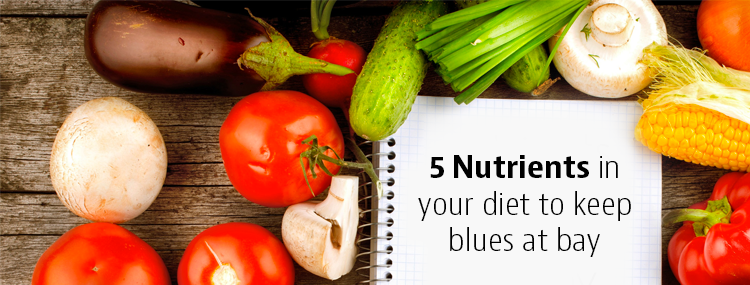
5 Nutrients in your diet to keep blues at bay!
Feeling the all too familiar blues? An occasional low is a part and parcel of life’s ebb and flow, but chronic depression is now on the rise in India. Researchers believe one in five women, and one in ten men in India are depressed. While weeping excessively and a feeling of melancholy or grief are overt signs that others may recognize as depression, there are subtle signs that often go unnoticed like loss of interest in daily activities, constant irritability, sudden aggression or suicidal ideation, feeling of helplessness, rash driving etc.
Any kind of stress or mental illness causes a rise in the stress hormone called cortisol and this hormone can increase food cravings, causing people to binge on unhealthy carbs and fats. This makes one put on weight, with concomitant chronic lifestyle diseases. Apart from cortisol, there are other hormones that regulate mood and energy, and they include serotonin, oxytocin, endorphins and dopamine.
Endorphins are the ones that are responsible for that “exercise high” – the general feel good factor that is the result of a good workout. For all levels of depression, exercise therefore should be an integral part of therapy and management.
Foods play very crucial roles in inhibiting and enhancing these hormone levels. Besides, foods provide vitamins, minerals and antioxidants that are important for sound physical and mental health.
Foods high in sugars and fats may be seen as “comfort foods” but they actually deprive you of comfort by increasing harmful free radicals in the body that in turn, increase risk of inflammation and cortisol levels. Its best to avoid consuming sugary beverages, sweets, and junk foods even when depressed as these are counterproductive and can increase your stress levels.
What foods will be beneficial? Although a balanced diet that provides a good balance of macro and micro nutrients is very essential for overall health, coupled with a regular exercise regime, the following key nutrients may provide optimum benefits to tackle depression.
Thiamine: A water soluble vitamin that regulates many neurological functions, thiamine needs to be supplied through the daily diet since the body does not store the vitamin. A number of health problems including mild depression, to chronic problems like dementia and possible Alzheimer’s, beriberi, Korsakoff’s psychosis and Wernicke’s disease are caused by severe thiamine deficiency.
Yeast is the best source of thiamine. Unpolished grains and millets are the next best while nuts, seeds, whole pulses are good sources.
Antioxidants: Antioxidants are a group of different compounds that work to prevent cell damage. Oxidative stress is a term used to describe excessive free radicals that damage the DNA of cells, which lead to chronic diseases including cancer, Alzheimers, diabetes and heart disease. Antioxidants quench the free radicals by neutralizing them.
The colors of fruits and vegetables especially the rich and dark colors of purple, deep red, yellow, orange and green have anthocyanins which are powerful antioxidants. Vitamin C, found in citrus fruits and amla, guava, capsicum , and beta carotene found in yellow orange fruits and vegetables are effective antioxidants that improve overall health and mental well being.
Omega 3 fatty acids: Foods rich in omega 3 fatty acids support brain function and reduce depression symptoms. They increase the levels of dopamine and serotonin.
Foods rich in omega 3 are fish, walnuts, flax seeds, cauliflower, mustard seeds, and spinach.
Zinc: Studies have analysed the relationship between blood levels of zinc and anxiety levels. They found that zinc supplementation helped improve symptoms of anxiety, depression and panic attacks. Low zinc levels also cause growth retardation in children, skin lesions and poor appetite.
While seafood, especially oysters, red meat are rich in zinc, for vegetarians nuts and seeds are the best sources. A handful of mixed nuts may provide the zinc you need in a day. Beans, Chickpeas, Whole grain cereals are also good sources of zinc.
Magnesium: Magnesium is an important trace mineral in the human body, and plays a role in brain biochemistry and the fluidity of neuronal membrane. Magnesium is also involved in production of an important antioxidant called glutathione. Deficiency in magnesium is known to cause – neuromuscular and psychiatric symptoms, including different types of depression.
Green leafy vegetables including spinach, mustard, pudina, and amaranth are great sources of magnesium. Whole grain cereals like brown rice, millets and pulses like black beans, rajma, horse gram are also rich sources. Seeds and nuts, banana and dark chocolate are other sources of magnesium.
Looking for a balanced meal replete with key nutrients? Look no further than Calorie Care, a one shop stop for all things nutritious and delicious, crafted by professional chefs and nutritionists. Order your health today at caloriecare.com!



